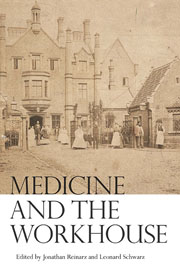Introduction
Published online by Cambridge University Press: 05 December 2013
Summary
Despite a relative dearth of work on the subject, the student of workhouses is bound, within a short space of time, to be led into the field of medicine. Nevertheless, one might ask why there has not been more work on this subject, given that emotional responses to suffering within the workhouse led the institution to figure so prominently in popular literature of the nineteenth century, the most well-known case being Charles Dickens's Oliver Twist (1838). In any case, what is becoming ever clearer is that workhouses were not established simply to warehouse the destitute, but they had their own, often specialist, sick wards, and sickness was a common cause of poverty, as well as a common route into the workhouse. However, the stories of inmates, where they have been collected and compiled, present some common, but also very diverse, experiences. The records, when they do go into sufficient detail, present a host of diseases and afflictions, at least as broad as recorded in the earliest voluntary hospital records. They also offer concentrations of particular cases, as illustrated in a number of the chapters in this volume, encouraging what at times might be described as an early period of specialization at some institutions. Nevertheless, few medical practitioners, let alone inmates, were eager to enter workhouses, usually spending short periods there before securing more prestigious posts at voluntary and endowed hospitals.
- Type
- Chapter
- Information
- Medicine and the Workhouse , pp. 1 - 16Publisher: Boydell & BrewerPrint publication year: 2013



